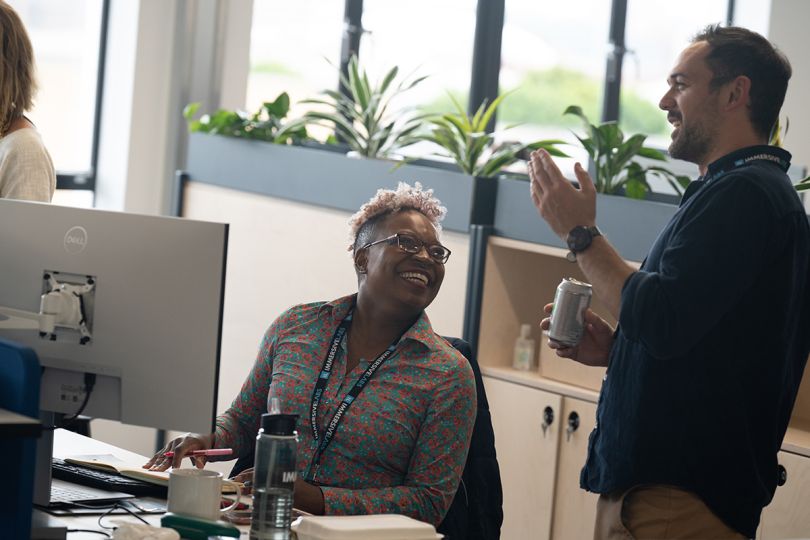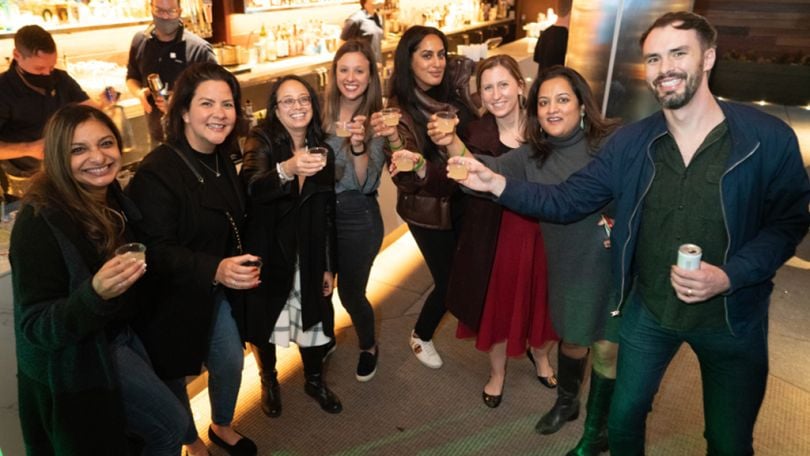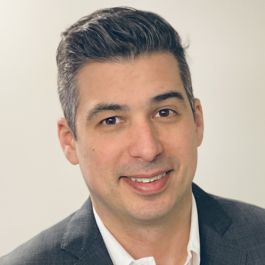“It’s not just lip service when I say this,” Nurah Muhamad declares at the onset of our conversation. “We really do put our people first.”
The director of customer success at Boston-area Immersive Labs spoke with an air of sincerity as she expressed the reasoning behind her claim. Labels like “people-first organization” are endemic in tech, Muhamad conceded — the type of statement that’s easy to make but harder to explain.
And yet it didn’t take long for Muhamad to demonstrate that there is substance to Immersive Labs’ commitment to a healthy work-life balance among its employees. Along with Senior Director of Channel Sales Jake Alosco and Senior Director of Growth Marketing Cate Cross, the trio of tech professionals didn’t hurt for examples when illustrating the company’s culture of personal wellness and employee flexibility.
“As an extrovert, I really love birthdays, which in the past has meant taking a spa day or using that time to treat myself,” Muhamad said over Zoom, where over the course of an hour she shared her love for dinner parties, trance music and Scotch eggs.
“At Immersive Labs, though, we get half-days off for our birthday,” Muhamad beamed. “Now it’s even easier to take time away from work to really disconnect.”
“Nurah, you’re doing it all wrong!” Alosco chimed in from his home outside Boston. “We’re birthday twins — she and I share the same exact birth date and year — and I take a birthday week off, so we gotta get your numbers up!”
Built In Boston met with Muhamad, Alosco and Cross to discuss additional ways team members at Immersive Labs benefit from a people-first company culture, and how the leader in cyber workforce optimization is empowering its employees to leave the old 9 to 5 firmly in the past.
About Immersive Labs

What is your favorite part of Immersive Labs’ company culture?
Alosco: For me, it’s the people. We’ve just got an amazing group of people that we work with, and our executive leadership is incredibly approachable. I’ve been at plenty of organizations where it isn’t thought well of you to email your higher-ups, but we do a really good job of making sure that’s encouraged.
Tell us about a moment when one of your leaders “walked the talk,” demonstrating a true commitment to culture.
Muhamad: I’ll always remember when I first joined Immersive Labs. It was Mental Health Awareness Week, and our CEO, James Hadley, wrote a very personal and vulnerable message in Slack. It was very meaningful to see a CEO share their personal experience like that, being very open about dealing with stress in the spirit of mental health awareness. I had never been with an organization where a leader was that open and vulnerable, and to me that shows that he truly meant it.
What do you do to foster work-life balance among your direct reports?
Alosco: I have a number of people who report to me globally, and a lot of my messaging comes down to reminding them that if they have to take time off during the day to attend to something to just go ahead and do it.
For instance, one of my reports used to continuously email me saying, “Hey, I’ve gotta go pick up my kids for school,” or, “Hey, I need an hour here to go grab something.” And I finally just responded back to her and gently explained that it wasn’t necessary. I see your schedule. I know how busy you are. If you’ve got things to do or something pops up during the day, just go handle it.
I don’t want anybody to get burned out. Whatever you’re working on, we can deal with it tomorrow.
Muhamad: I tell my team: “You’re all adults. I trust you to use good judgment.” One of my reports just had a baby, so I know there may be pockets of time when they’re offline. And that’s totally fine. Ultimately, to me, it’s based on outcomes. I trust them to work in whatever way makes sense with where their life is at, and then when I see someone working late, I’m not shy about telling them to get offline. I don’t want anybody to get burned out. Whatever you’re working on, we can deal with it tomorrow.
When it’s your turn to take time off, how does your company support your ability to fully do so?
Cross: Burnout is real, especially in tech. You can work around the clock and never sleep if you aren’t careful. The difference here, I think, comes from the U.K. side. Because our founding headquarters are in the U.K., there’s a different expectation that’s super-evident. People actually leave their work when they leave, and I’m still adjusting to it. There’s a net that’s woven by a strong team supporting each other that’s really outstanding, and an essential piece to making the remote-work piece possible.
There’s a net that’s woven by a strong team supporting each other that’s really outstanding.
Alosco: It all comes down to this sense of trust. One of the lessons I learned from my own burnout — the first year I came on board, let’s just say I had a very American attitude to how I approached my work — I was clocking 15-hour days, not taking time off, driving myself crazy.
Luckily, my manager came to me and said, “Dude, you’re going to burn yourself out. Take a week off, delete Slack from your phone, don’t respond to emails, and make sure you’re actually positioning yourself for success down the road.”
It was a great lesson to learn — that we’re all part of a team working to handle these responsibilities. I shouldn’t have to do it all on my own, and I have to be able to trust and have confidence in my team to go deliver the messaging that I want them to deliver. I appreciate that senior leadership had my back to make sure I was protected while I was trying to protect my team.
It all comes down to this sense of trust. The first year I came on board, let’s just say I had a very American attitude to how I approached my work.

What are your passions outside of work? How has a healthy work-life balance allowed you to pursue those interests?
Cross: Last week, I got to chaperone my kid’s school field trip to a folk art museum here in Vermont. It really was cool, because I was able to step away and spend quality time with my son and see him interact with his friends without any guilt. That’s definitely a big difference from the past when I’d have to use precious PTO time. It was fun for me to see him in his natural environment.
Muhamad: I grew up in a family of chefs, so I’m a self-proclaimed foodie and I enjoy sipping whiskeys and hosting dinner parties. I especially like themes. I lived in Scotland when I was a child, so Scotland holds a very special place for me, and I recently hosted a “Burns supper” to celebrate the Scottish poet Robert Burns. Traditionally, they serve haggis, which I think is gross, so instead my friends and I had a Scotch tasting, and I cooked Scotch eggs and a lamb and fish stew, which was fun, and we got dressed up in the traditional attire as well.
‘Do something you’ve never done before’
How does a strong team culture set you up for success in your role?
Cross: We just had someone get married on our team, and we were able to get someone to fully back them up while they were away for their wedding and honeymoon. This was great not just for that person to have time off, but it also brought a fresh set of eyes to the same problems. So we were able to benefit from giving this person time to do their thing, and now we have a whole other set of suggestions from somebody that we wouldn’t typically have gotten their viewpoint on. So it really does benefit a company in a number of ways.
Muhamad: When you’re working those long hours without resting in between, the quality of the work that you produce is diminished. I’d much rather have a team that is happy and prioritizes work-life balance in whatever form that means to them, because I know it will help them achieve better results. It’s a question of quality over quantity. If you’re burned out and your brain is just tired, you don’t produce quality things.
What does it mean to know your company is invested in you as people?
Muhamad: The combination of our personal life as well as our work life makes us who we are, and the best version of yourself involves both of these worlds. So to get support from Immersive Labs to be who you are and do what makes you awesome, and to be supported by these other initiatives, is really great. You can see people be who they truly are and be accepted, and that’s the true meaning of diversity and inclusion; it’s not just a corporate checkbox that you need to have as a company. It’s about really celebrating everybody’s individuality and embracing that your happiest employees are going to be your most productive ones.
The combination of our personal life as well as our work life makes us who we are, and the best version of yourself involves both of these worlds.
Cross: Allowing us to invest in ourselves, even if it’s random activities outside of work, really does feed into the person who will then come into work ready to tackle their goals. It’s kind of a long-game investment in terms of making sure people are happy and not burned out. But I have faith that it’s really going to pay off.







